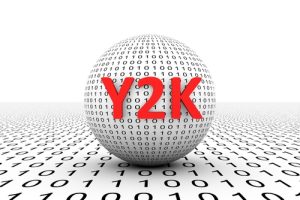Al Gore Was Also Behind the Panic in 2000 – Y2K Was Going to Shut Down the World
by Martin Armstrong, Armstrong Economics:

QUESTION: Marty, is it true that Al Gore was behind the Y2K scare back in 2000 that all the computers would crash and nothing happened?
JC
ANSWER: Yes. It was Al Gore back then who was behind the hype that the world was going to crash because the computers would all fail when the date turned from 1999 to 2000. I remember those days well. I ran tests on Socrates to see if there would be a problem and nothing happened. In computers, we generally do not use calendars. Instead, we use a Scalar Date System. In Socrates, for example, day 1 is 6,000 BC.
All of our data is recorded in this Scalar Date format. In other words, November 18, 2019, is day 2,929,261. In this manner, we can calculate the number of days between events and determine true cycles. We then have algorithms to translate that Scalar Date to the current calendar. We can translate the ancient date based upon whatever calendar they used at that point in history into our Scalar Date system.
So yes, Al Gore was a big proponent of the Y2K Crisis which resulted in billions spent on a problem that did not exist. Computer do not store dates in calendar format. So yes. He is at it again crying that the entire world is going to crash, again, but this time because of CO2.
Here is Al Gore Speech on Year 2000 Conversion.
Date: July 14, 1998.
Source: The White House, Office of the Press Secretary.
REMARKS BY THE VICE PRESIDENT
AT YEAR 2000 CONVERSION EVENT
National Academy of Sciences
Washington, D.C.
THE VICE PRESIDENT: Thank you very much, ladies and gentlemen. Thank you, thank you very much. I didn’t know I was going to get that kind of build-up, Bruce. Thank you. I do come over here a lot, and I appreciate all the kind words. And, Dr. Alberts, I want to thank you and all of your staff and team here for all of the help that you’ve given to the President and me, and to the administration, and to the Congress, and for the role that you play in our country.
It’s a great pleasure to be here with so many distinguished guests. And on behalf of the President, I’d like to spend just a moment acknowledging the folks who are on stage with us here. Before I do that, I want you to know that there are several members of the President’s Cabinet who are present here today, including the OMB Director, Jack Lew, who plays such a prominent role in this issue; and, of course, John Koskinen, who is Chair of the President’s Council on the Year 2000 Conversion. And we want to thank John for all the work that he’s done on this. Having been a part of the effort to persuade him to come back out of retirement and take this on, I want to really lay it on thick because he’s done a great job. Why don’t you stand up, John. We appreciate what you’re doing.
Also, let me point out that the Secretary of Labor, Alexis Herman, is here; and the Acting Secretary of Energy, Betsy Moler is here; Deputy Secretary of Labor Kitty Higgins and Deputy Secretary of Transportation Mort Downey; Deputy at SBA, Fred Hochberg; also, FCC Commissioner, Michael Powell; and others in the administration — Janet Abrams is the Executive Director of the Year 2000 Council; Morley Winograd with the Partnership for Reinventing Government.
And from the — I probably should have started with the members of the Senate and the House — I want to say a special word of acknowledgment to Senator Bob Bennett and his partner, Senator Chris Dodd — the two of them are leading the charge on the Senate side to create a very thoughtful, bipartisan forum for addressing this issue that faces our country and the world. And on the House side, I want to especially acknowledge Congressman Steve Horn of California and Congressman Dennis Kucinich of Ohio, Congressman John LaFalce of New York and Congressman Jim Turner of Texas.
Now, behind me here on stage are some distinguished Americans who are hard at work on the issue, and the President will be referring to some of them. But I want to acknowledge Erle Nye, a CEO of Texas Utility Corporation; Stephen Wolf, CEO and Chairman of the U.S. Airways Group; John Pasqua, Vice President for Y2K at ATT; Peter Turner, who is the COO at Torrington Research Company; and Sandra Wells who is in charge of Y2K for Torrington; and Ed Brown who is Vice President for Internet Services with First Union Bank.
Now, I took notes, Dr. Alberts, of your comments about me and technology, and I was recalling a magazine article — one of these airline magazines. And they had a list a few years ago of 31 signs that technology has taken over your life. I’ll just read a few of them: If you know your e-mail address, but not your Social Security number; if you rotate your screen saver more than your tires; if you have never sat through a movie without having at least one device on your body beep or buzz.
Now, here’s the point. My personal favorite was number 23: If Al Gore strikes you as an intriguing fellow. I don’t understand that. Why is that? But technology is, without question, a vital part of our everyday life, and we constantly face the challenge of making sure that we’re on top of it and mastering it instead of letting it take control of our lives and master us. And we’re here today to discuss what we all need to do to ensure that technology continues to be a path to prosperity and not a source of new problems, especially on the day when the calendar turns on the year 2000.
I’m speaking, of course, about the so-called year 2000 problem which, as everybody knows — well, unfortunately, not everybody does know it — but as many people know, and certainly everyone in this auditorium knows, it could cause serious problems for commerce and communications all over the world if we’re not serious about fixing it.
This is a story of conscious decisions by people years ago that led to completely unintended consequences. Back in the 1960s and ’70s, managers and programmers tried to save money by saving on memory. At that stage of the computer revolution memory was at a premium and they were trying to avoid using any unnecessary space in the memory storage areas. And so they came up with the notion of representing the date with only two digits, instead of four. So 1965 became just 65. And it saved millions of dollars, but it also created one whale of a problem.
The software assumed that every year began with 19, and it wasn’t programmed to read the year 2000. The programmers assumed, of course, that the early versions of software that they were using would quickly become obsolete, so they really didn’t think about it that much. But software has turned out to be a different kind of technology from toasters or cars — when you get a new version you don’t just throw away the old software, or at least when you develop a new version they didn’t throw away the earlier version, they built upon it and added to it.
And software began to evolve in ways that are not completely dissimilar to the evolution of life forms in the sense that the new forms recapitulated some of the earlier evolutionary steps. And without spending much time considering it, the software writers continued to think, well, we’ll soon replace this and if we fix the numbers, well, they’ll have to go back and fix it all over the place. And so they fell into a pattern of denial and it didn’t really seem to them to be a problem.
But as a result the flawed programs were replicated by each successive generation. And over time they built up and today we have hundreds of millions of computers and devices and tens of billions of imbedded chips that will not accurately read — many of which will not accurately read the year 2000. When you have that many of them, if only a small percentage of them don’t accurately read the date, then the world has a problem. And unless the old lines of code are fixed, the problems, of course, will be serious. And that means that if somebody gets a bill in December ’99 and doesn’t send a check until January of 2000, if that company’s computer isn’t fixed it might not register your payment because it will think the check is from 1900. And that would be the least of the problem. So it has to be fixed.
Read More @ ArmstrongEconomics.com
Loading...


